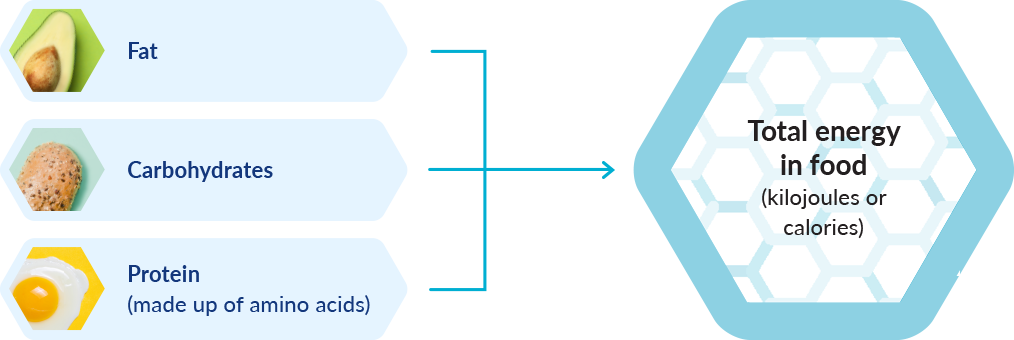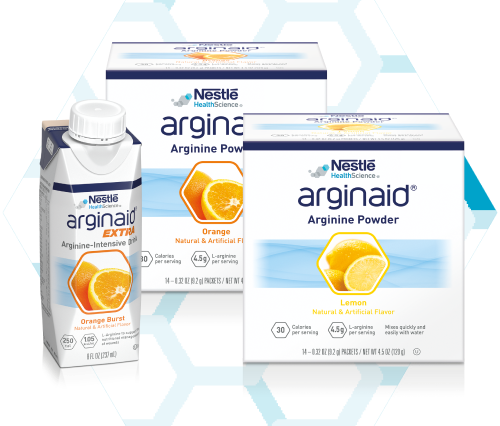Eating a well-balanced diet with a balance of protein, fat and carbohydrates and a variety of vitamins and nutrients is important for optimal health. However, when you have a wound, there are specific nutrients and foods for wound healing, that all assist in the healing process.
We eat food to fuel our body for energy, growth and repair. Energy requirements vary according to gender, age, activity levels and health status.
If you have a wound, your energy requirements are likely to be increased around 30–35 calories (125–145 kilojoules) per kg of body weight per day.1-3

Protein
Protein is a macronutrient that is made up of amino acids and is essential for repairing wounds, building new muscle, tissue and skin.
If you do not consume adequate protein in conjunction with a balanced diet, the body can break down muscle stores which may increase your risk of malnourishment.
 If you
have a wound, it is
recommended that you aim to consume around 1.25–1.5g of protein per kilogram of
body weight per day.1-3
If you
have a wound, it is
recommended that you aim to consume around 1.25–1.5g of protein per kilogram of
body weight per day.1-3
Foods that are high in protein include:
- Meat
- Seeds
- Eggs
- Nuts and legumes
- Dairy products
Arginine is a key amino acid in the process of wound healing
Protein is made up of chains of individual amino acids (the building blocks of protein). One amino acid called arginine is very important for the healing and repair of wounds and can help to assist with:
- Collagen production (an important component of skin tissue) to help the strength of the wound4-6
- Increased blood flow to the site of a wound bringing important nutrients to the wound to help it heal5,7,8
- Formation of new blood vessels, such as veins to help with blood flow4-8
- Immune function to help the body fight infections5,8
Fat
Fat has many functions in the body. It helps the absorption of fat-soluble vitamins, supports brain and heart health, and it contributes to energy for bodily functions, cell growth/structure and insulation.
Healthy fats such as unsaturated fats help to meet the increased energy required to support wound healing.
Examples of dietary sources of healthy fats:
- Avocado
- Nuts
- Fish
- Olive oil
Carbohydrates
Carbohydrates are an important source of energy for the body and help to provide the additional energy required for wound repair.
Examples of foods that are rich in carbohydrates include:
- Fruit
- Legumes
- Yoghurt
- Milk
- Wholegrain breads and cereals
- Starchy vegetables
 If you
have diabetes, you
may be required to control your blood glucose levels more closely when consuming
carbohydrate-rich foods, but these foods should not be avoided.
If you
have diabetes, you
may be required to control your blood glucose levels more closely when consuming
carbohydrate-rich foods, but these foods should not be avoided.
Vitamins
Several vitamins have been shown to play a role in wound healing:
- Vitamin C helps with collagen production at the site of the wound and has also been shown to help repair pressure injuries5,7
- Vitamin A also helps to produce collagen and increase the strength of a wound; low vitamin A levels in the blood can delay wound healing2,6,7
- Vitamin E is an antioxidant that can help protect the wound from damage from free radicals (which are chemicals produced by the body when there is inflammation) and can also improve the wound healing process2,7
- Zinc plays an important role in wound healing as it is needed to produce collagen; a deficiency in zinc can delay wound healing and lower wound strength5-7
- Iron helps to deliver oxygen to the wound to help with healing2,3
Overall, good nutrition is important for healing wounds
Healthy eating for wound healing means choosing a wide variety of foods from each of the five food groups, which are:
- Breads, cereals, rice, pasta and noodles (opt for wholegrain or wholemeal varieties)
- Vegetables
- Fruit
- Dairy products e.g. milk, cheese, yoghurt
- Lean meat, fish, poultry, eggs, nuts, legumes, tofu and other meat alternatives
However, for some people, it may not be possible to achieve adequate levels of essential nutrients for wound care through normal food intake alone. In these cases, the use of nutritional supplementation may be beneficial and has been shown to support wound care.1,4-8
For individualised nutrition advice on wound care management, talk to your healthcare professional.

Oral nutritional supplements such as ARGINAID® contain essential nutrients and have been shown to help support wound management.5
Learn More ➜